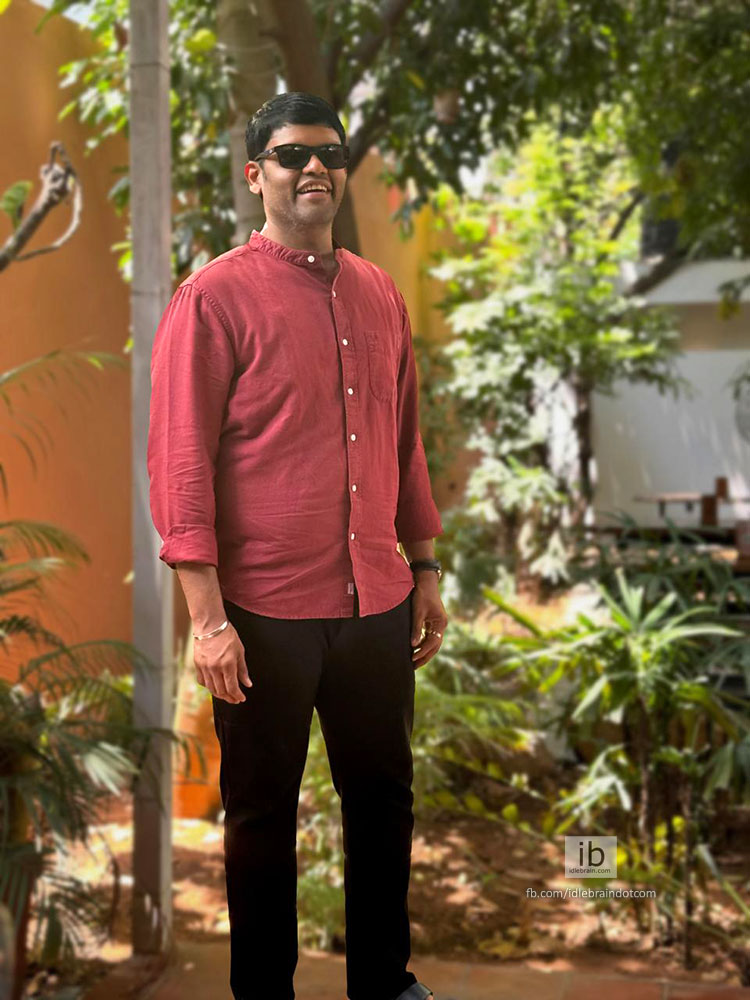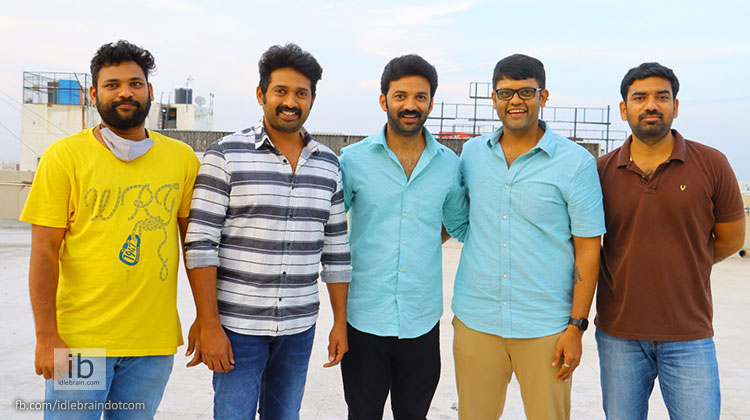
18 June 2024
Hyderabad
Beginning his career as an executive producer on films like Vinayakudu, Villagelo Vinayakudu and Kudirithe Kappu Coffee, Rakesh Mahankali made the big switch to production with Paathasala (2014), which he co-produced with Pavan Kumar Reddy. He has now written and produced Dear Nanna, which is streaming on aha. It is a moving tale of a father, Ravi (Surya), who hopes his son Surya (Chaitanya Rao) will take over the family pharmacy. But Surya is passionate about becoming a chef. How do their conflicting aspirations shape their relationship? Will Surya go for individual dreams? Or will he accept the changes in his career? In an exclusive conversation with idlebrain.com, Rakesh spoke about the response to Dear Nanna, his background, his aspirations, who he looks up to in the industry, the genre he likes the most, the status of small films, his next Sundarakanda and more…
What have been the reactions you have gotten so far for Dear Nanna?
The response has been extremely good and we are expecting more. We promoted the film as a mainstream one. We screened the film to 80 people sometime back. I wouldn’t say that all of them loved it crazily. But I did get messages from three-four people, saying that they wept seeing it. That itself was my success, I felt. The film has been lapped up especially by people who are aged between 25-55 years.
Could you share with us a bit of your background?
I come from a pharma background. We have seven-eight medical stores in Hyderabad. One of our stores is very popular. Called SS NIMS, it is right behind NIMS Hospital, Punjagutta. My father started in 1992 and I joined him in 2004, expanding our business into distribution as well. We supply cancer medicines to all the hospitals, retailers and to some patients directly. The pharma business is going on. I’m passionate about films. On and off I’ve been trying to settle down in the field slowly. The problem with being a producer is that if we get a good name with our first film, it’s a bigger challenge to live up to it with the second film. I’ve been in the industry for the past 16 years. I took a break of three-four years in between. The break got extended because of COVID-19. During the second wave, my aunt’s husband passed away due to the pandemic. He also ran a pharma store in Moosapet. It was right behind a clinic. If he had been a frontline worker, he would’ve been alive today. That thought triggered me to write Dear Nanna.
Why did you opt for an OTT release?
Dear Nanna is a 45-minute film. My chief technicians, the director and the hero asked me to extend the script and make it into a one-and-a-half hour movie. I replied, saying this film doesn’t need that amount of time. At the most, I could’ve extended for 10 minutes, that’s it. At first, I thought of developing it as a one-day short film with five-minute duration but it organically grew big. It is the reason why we took the streaming route. I’m hoping that indirectly I’m opening a new space where we can tell stories of 1 hour and beyond leaving the commercial elements aside. That way the budgets will also be under control. If told convincingly, there is an audience for short content as well.
Were you involved creatively during the making as you’ve written the story as well?
Not very much, but I used to have discussions with the director every day. My best friend Anith Madadi worked as a cinematographer on the film. We are friends from college. He helped us a lot in the making; he would advise us on the budget and help plan things as well. I used to be there on sets every day for three-four hours. Overall, I was comfortable because Anith was there.
How did you pick the director Anji Saladhi?
Poster designers Anil and Bhanu are my 3am friends. When I shared Dear Nanna’s idea to them, they said it was interesting and referred me to Anji Saladhi, who was a writer at that time. We hit it off instantly over the script. In a cinematic way, one day he asked me, ‘Why are you searching for directors? Why can’t you give me an opportunity?’ I asked him to give me a week’s time to get back to him. I pondered over it and felt why I shouldn't offer the film to him when he helped me to structure the story. He knew the story in and out and so I gave him the opportunity.
As a producer what was the biggest challenge you faced with the film?
To get to the streaming platform aha was the biggest challenge. To reach out to people, we can always put it on YouTube. I wanted my movie to be positioned in a proper way. There’s no value for things that come for free. I can’t promote the film on YouTube in a proper way. Again, I would’ve required spending an equal amount of money that I spent on the making. aha will help you reach more people. We open aha for a reason unlike YouTube which we open randomly.
What basic quality do you think a producer must possess at any cost?
Let’s say a writer has a skill set. Similarly the production guy has to have a skill set. If I’m producing a film and if I don’t have a skill set like what a writer has, I need to hire people who have such skill sets to ensure a smooth production process. It’s a must have for any producer but the point here is that people don’t see production as a skill set job. Out of 100 people, 20 people look that way. However, after the OTT boom, the trend is changing. 20 is becoming 30, 40.
What excites you the most about production?
Whenever we have an event at home, we have an excitement to celebrate it, right? Similarly, going to the sets everyday excites me. On shoot day, I feel a surge in excitement. I go back home with that high. If there's a shoot the next day, I go to the sets with the same anticipation of high.
What are your goals as a producer?
Earlier, I and Mahi V Raghav used to work together. Now I started my company, Black Pepper Cinemas. Sundarakanda with Nara Rohith is the second film under it. For the next five years, I want to make 10 films. It’s a realistic target. I don’t know how many films I will end up making but I want to achieve at least 50 percent of my target.
How do you assess a good script?
Now we are at a stage where we are getting pitch decks. The material has to excite me, only then I will get deeper into it. If it is exciting in the first two-three minutes, then you’ll have my attention. Narration is secondary to me. Sometimes a good narrator can make a bad film. Sometimes a bad narrator can make a good film.
What type of stories do you get attracted to generally?
Emotional drama is my favourite genre. Maybe that’s the reason why I wrote Dear Nanna. Puri Jagannadh is my favourite director. I gave him a thanks card at the end of my film. After writing Dear Nanna, I felt there is a lot of Trivikram influence on me. If you see the film, it will be similar to his style in terms of dialogue and how you stage a narrative. Overall, I want to tell stories which are emotional.
Is there any producer that you look up to in the industry?
I look up to Dil Raju garu. His name alone will bring people to theatres. Success and failures are a part of the game but over a period of 20 years, he has built a brand for himself. For instance if you are shifting from one channel to another to catch a good program and in the process, if you come across a speech or a short clip of his, you’ll listen to him.
What do you think is the status of small films in the industry right now?
After COVID-19, the term average has ceased to exist. Either it’s a hit or a flop. It’s definitely a challenge for filmmakers to come up with solid content. Audiences’ consumption of content has changed after the pandemic due to the ascent of OTT platforms. We seem to be longer visiting theatres the way we used to earlier. We are witnessing the transition. It takes some time to settle down. As small film producers, we are being challenged to give good content. Maybe in the next three-five years, there will be hybrid models where theatres and OTT platforms co-exist. We are in an era where we are absorbing a lot of Korean content and two-three years down the line, the new generation will be more inclined towards Korean dramas and they will begin in play in our theatres albeit dubbed.
What can we expect from Sundarakanda?
Keeping the commercial aspects aside, the film is bound to get glowing reviews on its OTT platform. I’m confident about it. For instance Om Bheem Bush worked more crazily on Amazon Prime Video than in theatres. I would see Sundarakanda in a similar space. Of course it should work in theatres as well.
-NAGARAJ GOUD
You can watch Dear Nanna movie here

